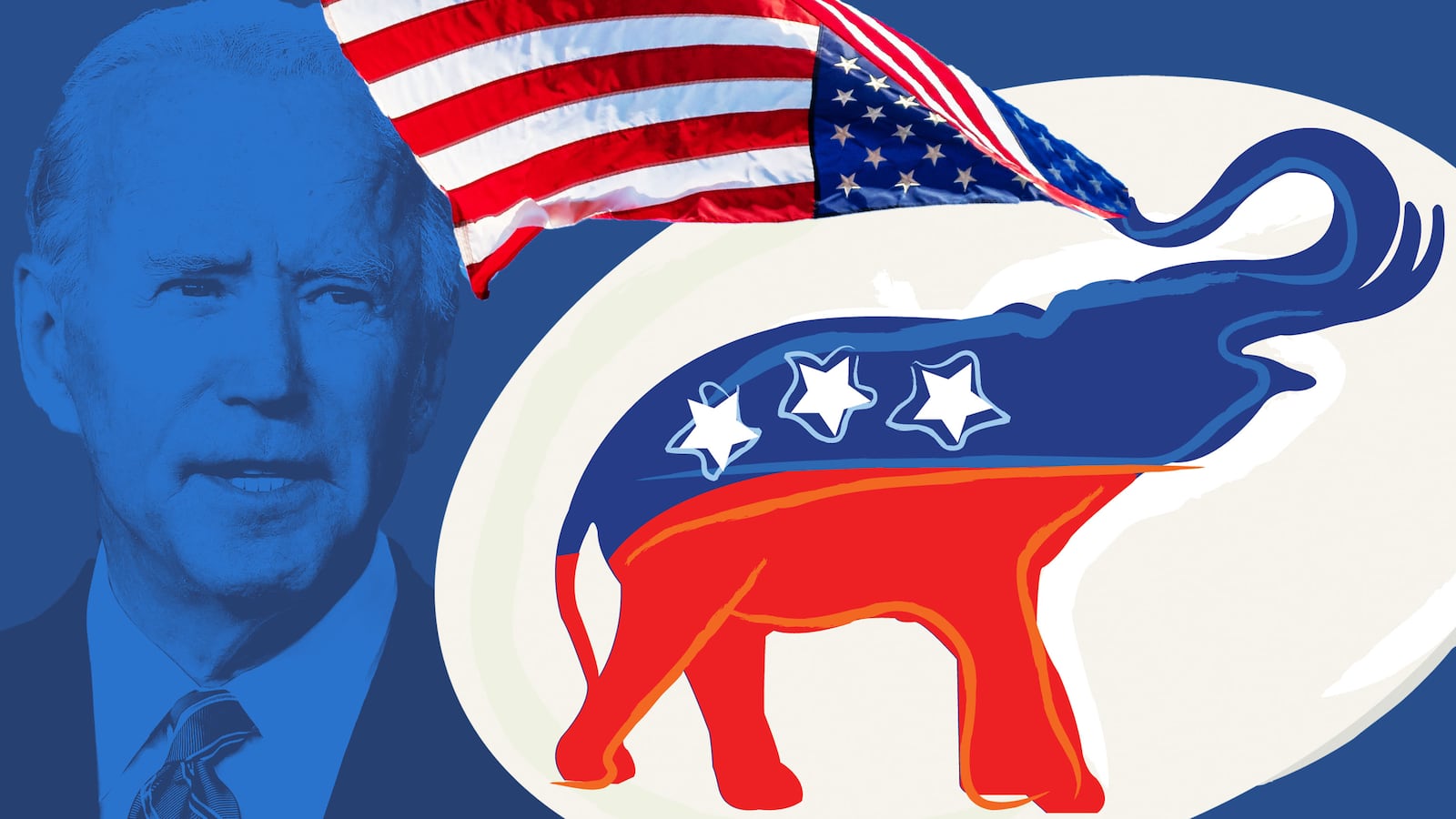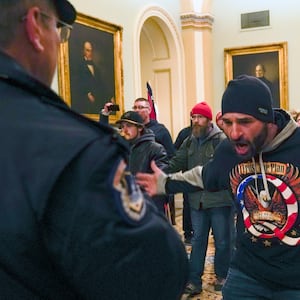As domestic violent extremists invaded the Capitol on Jan. 6, they shouted “we were invited here” by President Donald Trump and his fellow Republicans, some of them members of Congress in the Capitol building the insurrectionists were attacking.
The events of last month made clear that President Biden faces a daunting challenge: Uprooting an entrenched infrastructure of domestic violent extremism without leading the nation into an even greater civil conflagration in the process. The challenge is all the greater, given how deeply rooted insurrectionism has become in the Republican Party.
The roots of the Republican Party’s descent into supporting violent opposition to democracy itself are long and deep, but the events of 1995 are particularly relevant. In January of that year, Newt Gingrich became Speaker of the House, inaugurating what was to become 25 years of ever more nihilistic attacks by GOP officeholders on the governmental institutions they are charged with leading. In April 1995 came a mass casualty event inspired by the same extremist impulse: The bombing of the Alfred P. Murrah Federal Building in Oklahoma City that killed 168 people, including 19 children.
As Peter Keating has recounted, in the wake of the bombing, President Bill Clinton’s cynical but insightful pollster, Dick Morris, recognized that supporters of violent extremism were, inevitably, becoming an integral part of the GOP’s base and advised the president to exploit the phenomenon. Morris argued that Clinton should set out to “stimulate national concern over extremism and terror,” and then take aggressive law enforcement measures against right-wing extremist groups. That, Morris predicted, would induce squeals of outrage from GOP constituents, inducing their representatives to come out in opposition to the crackdown. The result, Morris predicted, would be a “self-inflicted linkage between party and extremists,” and the public’s identification of the GOP with violent extremism.
While Morris’ advice was characteristically cynical, it was also insightful. Unfortunately, the Clinton DOJ did not order a law enforcement crackdown on the then nascent domestic extremist movement; if it had, history may have turned out differently. But Clinton did send the message Morris suggested. During his 1995 State of the Union address, Clinton introduced Richard Dean, a veteran who had entered the shattered Murrah building four times to rescue survivors. Then, in the midst of applause from both sides of the aisle, Clinton told the audience that Dean had been barred from his office in November of 1995 by the GOP-engineered government shutdown, but continued to help Social Security recipients as best he could, without pay, in the face of the GOP’s destructive attack on the nation’s governmental institutions. In a commencement speech weeks after the bombing, Clinton had hit on the same theme, telling the graduates that “there is nothing patriotic about hating your country or pretending that you can love your country but despise your Government.”
As Morris anticipated, GOP legislators, recognizing that extremists were even then becoming an increasingly important GOP constituency, began loudly complaining that the militia movement, and other anti-government paramilitary groups, were in fact patriotic Americans being harassed and oppressed by a hostile government.
The GOP’s nascent role as protector of its growing extremist faction was reflected in the rhetoric of then 15-year-old Josh Hawley, who penned a column for his hometown paper in Lexington, Missouri arguing that many extremist militia members were misguided but nonetheless good-hearted patriots who responded to purported challenges to their “liberty” by “slip[ping] into talks of ‘conspiracy theories’ about how the federal government is out to get them.”
During the ensuing 25 years, the GOP has fully integrated those same violence-prone conspiracists and neo-fascists into the heart of the party structure. That integration is now so advanced that state and federal party leaders, many of them holding elected office, are not merely cynically exploiting anti-government extremists for political gain, but are themselves full-blown members of the extremists’ ranks. Likewise, there is increasing evidence that the party’s funding and organizational structures are now integrally connected to extremists and their supporters.
The radicalization of the GOP and its leadership is becoming all the more damningly clear as information about the events leading up to the Jan. 6 insurrection continues to come to light, including that:
- Before and after Trump’s electoral loss, a dark money entity called Donors Trust, which is regularly used by wealthy Republicans to mask their donations, gave tens of millions of dollars to groups promoting Trump’s baseless claims of voter fraud and supporting his efforts to overturn the election;
- An heir to the Publix supermarket chain fortune contributed $300,000 of the $500,000 cost for Trump’s pre-Capitol attack rally. Publix itself has donated $100,000 to the re-election campaign of Florida Governor Ron DeSantis;
- An arm of the Republican Attorneys General Association promoted the rally with a robocall declaring: “We will march to the Capitol building and call on Congress to stop the steal,” this after numerous GOP AGs had unsuccessfully petitioned the Supreme Court to void the outcome of the election;
- At least 19 state and local Republican officeholders attended the Jan. 6 rally, with some joining other insurrectionists in the storming of the Capital;
- A number of GOP House members have well-documented connections to the Proud Boys and other domestic extremist groups that played roles in planning and carrying out the assault on the Capitol;
- Parler’s CEO was fired by co-founder and heiress Rebekah Mercer after arguing that the social media app—which was heavily used by those planning the Jan. 6 attack—should monitor communications by extremists and others inciting violence; and
- While the young Josh Hawley described anti-government conspirators as well-meaning but misguided, Senator Hawley openly joined their ranks with his clenched fist salute to the rally crowd that would soon storm the Capital, even as he was in the building waiting to vote in favor of Trump’s scheme to overturn the election.
In sum, the “self-inflicted linkage between (the Republican) party and extremists” has become a merger, with extremism forming a core component of the GOP’s base, and its ideology, a tendency that if anything has grown since Trump lost the election and exited office, as evidenced by the standing ovation the notoriously bigoted conspiracist Marjorie Taylor Greene received last week from the House Republican Caucus.
While the GOP once made efforts, however incomplete, to purge John Birch Society conspirators, racists and anti-Semites from its ranks, House Minority Leader Kevin McCarthy has declared that the GOP’s big tent— which Ronald Reagan once opened to moderates and independents—will be permanently housing extremists like Greene.
Furthermore, as the events of last month demonstrated, the danger of outright violence posed by the extremism that the GOP now nurtures has never been greater. A Bulletin issued by the Department of Homeland Security last week warned that domestic violent extremists now pose a threat, not only to human life but also to “critical infrastructure,” including electrical and telecommunications systems, as well as government facilities.
Recognizing the scope of the threat, President Biden has announced that intelligence agencies will conduct a “comprehensive threat assessment” directed at overhauling the government’s response to domestic extremism.
But given that the links between violent extremism and the Republican Party—along with a large segment of the nation’s population—are now wide and deep, the challenge of uprooting domestic extremist networks and their support structure is more daunting than anything the nation has faced for decades, possibly since Reconstruction. Furthermore, unlike in the wake of the Civil War, today’s supporters of insurrection have not been defeated in battle; to the contrary, some are situated in positions of power and influence. And it is a certainty that they will use every lever available to stymie and undermine any substantial law enforcement efforts.
Many leaders of what has become the GOP “establishment” have reason to fear the kind of thoroughgoing investigation of domestic extremism that law enforcement agencies have previously conducted of foreign extremist groups, one that extends to reach the financial and organizational support for domestic extremist networks. It not only appears likely that such inquiries will reach Republican officeholders, but also some of the party’s wealthiest donors, many of whom have previously been able to mask their identities and roles behind dark money conduits like Donors Trust.
One can well expect those with the most to lose from an effective investigation of the nature and scope of domestic extremism will do everything they can to increase the political stakes, and to demonize the investigators, a strategy Donald Trump employed to great effect.
Leaders on the right are already sending out warning flares to their followers, preemptively challenging the legitimacy of such law enforcement efforts. Tucker Carlson has declaimed to his audience that investigations of white supremacist violence will be an investigation of “you,” and asserted that the direction of law enforcement resources against domestic extremism is a threat to the liberty of all on the right.
For his part, Newt Gingrich—who seethed decades ago as Bill Clinton associated his nihilistic attacks on government institutions with then nascent militia violence—has described the calls for action against insurrectionist celebrity Greene as the actions of a “lynch mob.” Even Nikki Haley, who initially criticized Trump’s incitement (to the displeasure of a GOP gathering), is now mocking Biden for “protecting the Capitol from Americans.”
The purpose of these messages is clear: To create a threat that a thoroughgoing offensive against domestic extremism will lead to a conflagration, as the millions who just went to the polls to vote for Trump and other extremist candidates are induced to feel themselves to be threatened, along with those who incited them.
Furthermore, while there is increasing support for a robust and comprehensive response to domestic violent extremism, and talk about devoting additional resources, there also remains an entrenched resistance in the law enforcement community—including within the FBI—to, finally, taking such steps. That resistance must be overcome. Certainly, Biden’s attorney general nominee, Merrick Garland, who oversaw the prosecution of the Oklahoma City bombers, understands the nature of the threat.
At the same time, a crackdown alone will not suffice. As Anne Applebaum recently observed, a sustained and effective campaign against the extremism that has become deeply rooted in the nation—and in the Republican Party—will resemble anti-insurgency campaigns undertaken in countries plagued by civil war. Such efforts inevitably fail when they rely on force alone. Rather, it is also essential to invite those who have lost faith in the nation’s democratic system—but have yet to engage in active insurrectionist violence—a place in the society, including by offering them everything from health care to infrastructure development projects. That seems to be very much at the heart of Biden’s call for unity, not so much an offer to adopt Republican policies as to offer all Americans—including those Applebaum describes as “MAGA-infected”—the benefits of a government that demonstrably works for them in a time of crisis.
Accordingly, initiatives like the stimulus bill may prove to be as integral to Biden’s efforts to combat domestic extremism as the now essential law enforcement initiative. He’ll need to remind Americans—including some of those who have been attracted to the GOP’s most incendiary attacks on the nation’s democratic system—that they have a concrete stake in preserving the nation, rather than undermining its central institutions.
As for the Republican Party, its deeply rooted, and now overtly insurrectional, opposition to the nation’s democratic institutions will make a root and branch law enforcement offensive against domestic extremism a threat to the very survival of the party. Accordingly, we can only expect the opposition to such investigations from the GOP to become ever louder, and more threatening. Nonetheless, the Biden administration must not make the error Bill Clinton did 25 years ago, and shrink from pursuing a comprehensive effort against an ever growing, and ever more toxic, threat to the republic. The cost of failing to do so could be catastrophic.







